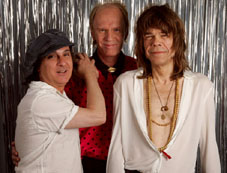Doll Face

Last night I went and saw New York Doll, which as everyone knows by now is about Arthur "Killer" Kane, the New York Dolls' bass player. He's the tall blonde guy in the middle.
There will be time to write a review of the movie when it comes out on DVD. For now, I'd like to take this opportunity to mention something about pop music that has intrigued me for a long time.
According to New York Doll, Arthur Kane spent the 30 years following the New York Dolls' breakup in a swirl of alcohol, self-destruction and bitterness at the success (to one extent or another) of his bandmates. After a fall from a third-story window, he converted to Mormonism and got a job in the genealogy center of the temple on Santa Monica Boulevard.
 The movie shows a soft-spoken (actually stuttering), often confused, even lost-looking big guy riding the bus to work and wondering what the dickens happened to him, until the surviving Dolls (minus the deceased Johnny Thunders and Jerry Nolan) get an offer to reunite for the big Meltdown show in London. This is the last guy in the world you would ever expect to be playing rock and roll, particularly New York Dolls rock and roll.
The movie shows a soft-spoken (actually stuttering), often confused, even lost-looking big guy riding the bus to work and wondering what the dickens happened to him, until the surviving Dolls (minus the deceased Johnny Thunders and Jerry Nolan) get an offer to reunite for the big Meltdown show in London. This is the last guy in the world you would ever expect to be playing rock and roll, particularly New York Dolls rock and roll.On the other hand, the movie's website (see above) tells stories about Arthur back in the 70s stealing bikes with a friend, wrecking hotel rooms, nearly getting his thumb sliced off by a jealous girlfriend, and generally cutting such a threatening figure that he nearly scared the hell out of Johnny Thunders merely by approaching him to see if he was interested in forming a band. In short, just about what you'd expect from a rock star.

It's in pop music more than in anything else, I think, that this kind of radical change takes place. I find myself imagining Arthur Kane, or Stu Cook or Mark Lindsay or even (dare I say it) Cat Stevens, catching a glimpse of one of their early publicity photos, then looking at themselves in the mirror and asking "Am I still that person?" I suppose everyone gets that feeling periodically throughout life, but because pop music has been such a young person's game, I imagine that pop stars whose fame has ended get pulled up short like that most often. Their youths, in some cases, still exist on thousands of photographs and recordings. They lived their early maturity in public, surrounded by people and traveling all over the world. Even Arthur Kane, whose band did not get all that famous, got to go to London. And let's not forget that in some cases, they moved through that very large youth in a drug-fueled haze. I just wonder if they look back on that time and wonder if it really happened, and who they are now.
By the way, there's an essay by Robert Christgau in a book called Stranded, in which he says that if he had to spend a year on a deserted island and could pick only one album to take with him, New York Dolls is the one he'd choose.

(Other rock writers picked things like Astral Weeks and Something Else by the Kinks and Sticky Fingers and even Trout Mask Replica, all good responses to a question that I'm SO glad I don't have to answer.) Christgau said he'd take New York Dolls partly because it contains such a variety of skills. According to him, David Johansen and Jerry Nolan had the most professionalism, which is to say consciousness about what they were doing. Sylvain Sylvain, he said, was a perfectly good rhythm guitarist but not particularly original. Johnny Thunders was an amateur, which was a good thing because it meant he produced truly inspired riffs and lines that a polished professional never could, and that his guitar was therefore the sound of pure inspiration direct from the unconscious. Arthur, on the other hand, lacked both professionalism and inspiration. It was a good thing for the Dolls' sound, said Christgau, but nevertheless what you hear Arthur do on New York Dolls tracks is the sound of an enthusiastic but totally ordinary guy just trying to keep up.
Well, David Johansen (a pretty unimpeachable source) disagrees. He wrote, from a tour stop in Europe, "[Arthur's] bass playing and presence were the heart & soul of the NY Dolls and the secret ingredient of our sound." Maybe that's why he rarely moved or let his face assume any particular expression onstage; he didn't have to.
Benshlomo says, Some things change and some don't.

0 Comments:
Post a Comment
<< Home